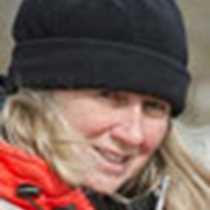Prek K’Dam & Angkor Ban, Cambodia
There is so much to learn in this world. Where do we begin or end? Our understanding and our tolerance for others would be so much greater if we had deeper insights into their lives. Our day began and ended with the sound of chanting broadcast across the fields and drifting down the river. We were intrigued but did we comprehend?
We poised ourselves upon the decks to greet the rising sun. An enveloping haze, part moisture and part smoke, softened the structures on the shore and muted their brilliant colors. Buddha sat peering out at the junction of the Tonle Sap and Mekong Rivers. We climbed to the bluff above to visit the pagoda and village of Prek K’Dam. Who were the observers as we arrived pre-breakfast, just in time for morning blessings echoing from a loudspeaker? We thought we are the ones that toured the town and looked upon the craftsman hard at work tapping patterns into silver dishes or annealing copper plates with fire. We glimpsed into the baskets offered by teenage girls and one or two were tempted to purchase a silver plated box or two. It was time for school and girls and boys strolled past dressed in blue and white and our camera shutters clicked. But if one stopped to glance around we saw that there were many more eyes turned our way. A cluster of monks in saffron and burnt orange robes sat quietly beneath the trees. Never turning his gaze from us, one reached out and patted a giant hog resting at his feet. Another stood alone, a cigarette dangling from his fingertips. A grandchild held tight within his arms, an elderly man on a bicycle frowned as we passed by. What do they think of us?
The Mekong widens, sand bars reaching their fingers deep into the channels. Wide beaches line the edges appearing as deserts where little grows. Cattle are herded to the water’s edge for a refreshing drink, plodding from the oasis of grasses on the bluffs above to the essential water below. Their emaciated forms seem to cry out for the wet season to return. The skies respond, giant billowing clouds piling up, a signal that spring has arrived and with it soon will come the monsoonal rains. Fishermen pull their long boats up onto the same beaches and camp upon the sands. The pods of kapok trees explode with snowy fibers ready to be harvested.
At Angkor Ban the dust billowed from the roads as ponies trotted past busy on their missions. Loads of alluvial soil were carried from a dry streambed and spread upon the yards of town. A cart of sugar cane will become sweet syrup when reeled through a hand-cranked press. The town looks prosperous, its houses all on stilts but finely built with ornamented rooftops. The temple too was bustling. Youthful monks with cans of paint spruced up entryways and stupas.
Beaches and sunsets seem to go together with bonfires and camaraderie. And here on the Mekong River, a chant drifted once again across the waters. Was this a blessing for the night to come or thanks for the day gone by? No matter the real intent, both seem appropriate.




